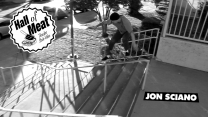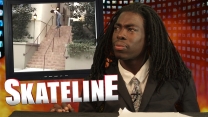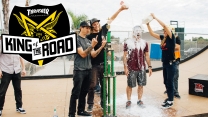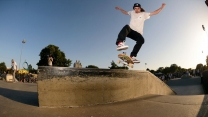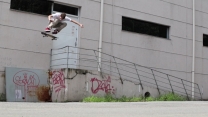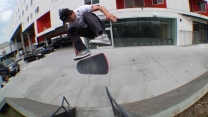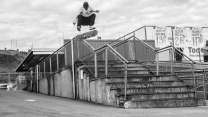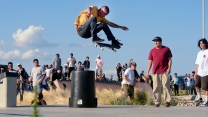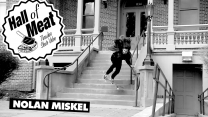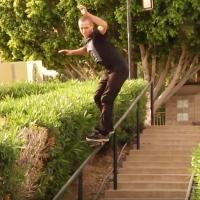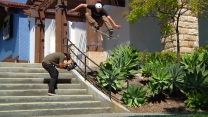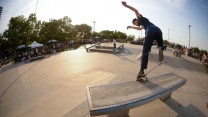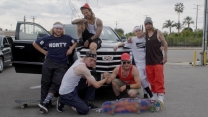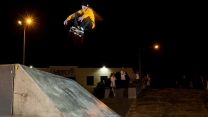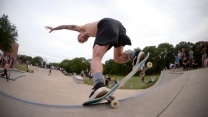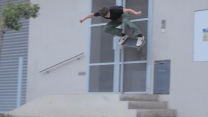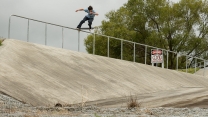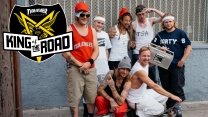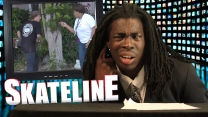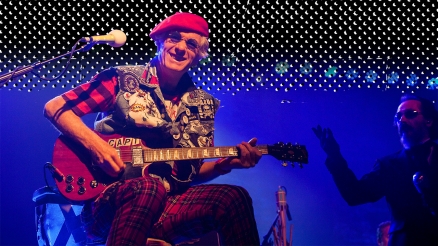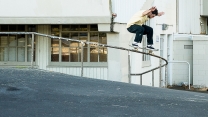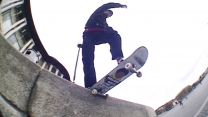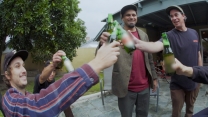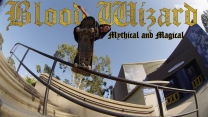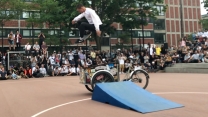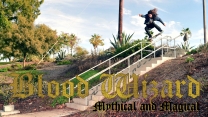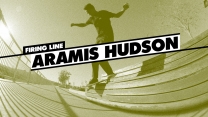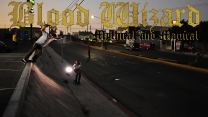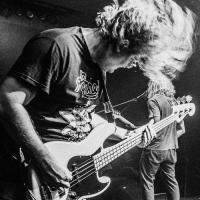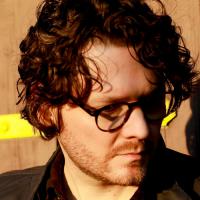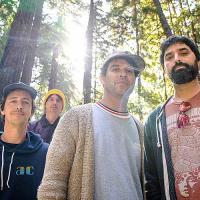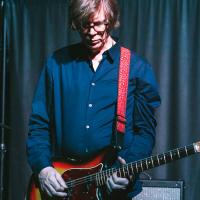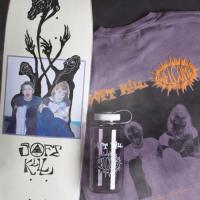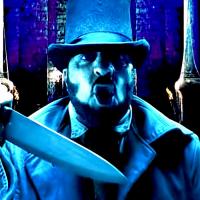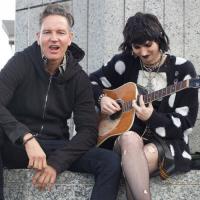The Damned Interview

The Damned are among the first generation of British punk and still standing. Their early stuff helped define British punk but they were also a very different band—not really overtly political, always seemingly out to have a good time and unafraid to thumb their nose at convention—than the emergent punk bands that bowed to increasing convention. They took a turn toward goth, led by front man Dave Vanian, and were at the vanguard of that emergent movement as well. This was their 40th anniversary tour and the show killed. They played mostly old songs—although they went through several line-up changes, Captain Sensible and Dave Vanian were right there at the beginning—kicking it off with “Melody Lee” and ending with two encores, including Captain’s solo tune “Wot” and a cover of Elton Motello’s “Jet Boy, Jet Girl.” We started off the interview with Captain sitting down on a bin full of equipment, which promptly gave way. He broke some ribs just a couple weeks prior and winced as he sat down. –Wez Lundry
Captain Sensible: I was just saying the guy from Thrasher is coming, and I do sympathize with skate dudes who have injuries. It’s probably part of the thing, really.
We call it paying dues, and it comes with the territory.
A few weeks and it’s all right again. I’ve fallen off stages before. I’ve broken my ankle. So what? You can’t hang back and be a scaredy cat.
What was your original motivation for playing music?
I fell in love with music and there was all this fantastic glam rock around, really lively, Sweet and Slade, it was a British thing mainly, I think. I was so excited, I went out and bought a guitar. I practiced at home an hour or so a day. By the time I learned how to play, glam rock had disappeared. There was a really boring country/prog rock vibe going on: Little Feat, Yes, Genesis, the Band, Emmylou Harris. There was all this insipid music. I wanted something raunchy and exciting. A lot of people in London were of the same persuasion. We wanted to hear something exciting and wild, so basically we did it for ourselves, never thinking it’d be popular or successful.

One of the things I find incredible is if you think about Gary Glitter, he had a pretty fucking terrific run, early 1970’s, top-ten hits. If you look back at that stuff now it’s a bit strange, like the videos of him performing on TV shows. But he had a shit ton of hits and he rocked.
He had an incredible sound
Two drummers!
And the guitar tuned to octaves. And his first album there weren’t really any chords at all. It was all kind of single-note drone stuff. It was a unique sound. I was a huge Glitter fan, I have to say. I went to see him play a really big gig in London and I managed to gate crash the party afterward. I went up and asked him to sign my poster. He said, “Let me confide in you: all the people here, the journalists, the hangers on, they probably don’t like me. You’re probably the only person who does. Look at all that food over there, and the booze, go help yourself and good luck to you.” And he signed my poster. He was the nicest bloke. He gets bad press because of the stuff he’s done.
I like his music, but you kind of have to separate the artist from the artist’s music.
The problem is, yeah, it’s a sensitive subject but it’s a good one. There are a lot of classical composers, Michael Jackson, others who’ve been accused of things. Do you just stop playing their music? I dunno. A lot of geniuses are flawed and slightly mad.
What made you pick up the guitar?
I love pop music. I love the Beach Boys and the Beatles. When ’67 came along, psychedelia came along and suddenly music became a lot more interesting and experimental. I heard the Stones’ Satanic Majesties record, Beatles’ Sgt. Pepper, and in particular Pink Floyd’s Piper at the Gates of Dawn, and they had a single called “See Emily Play.” It was a total mind trip, but I was only a 12-year-old school boy. I so wanted to be a part of that ’60s love generation, but I was too young. But I was enthused by the whole thing. It looked like so much fun. Scantily-clad birds dancing with big white kinky boots and mini-skirts! I thought, “Wow, I don’t want to be in school. I want to be in that club cavorting with all these dolly birds!” So I went and bought a guitar! But by the time I arrived it was blokes with clanking chains and mohawks, slightly different. But fucking good fun, though!
What guitar players’ sound do you like?
I absolutely adored Jimi Hendrix. He was the greatest and there’s never been anyone better. Jimi Hendrix, for me. Yeah. I listened to his playing over and over, tried to copy his licks. He was such an innovator and so melodic. I went to London and they put these blue plaques outside the walls of where famous composers and musicians lived, so they put a blue plaque outside the flat he lived in in 1967. I went to the ceremony where the curtain opened, Pete Townsend made a speech and I managed to gate crash the party afterward and met his girlfriend who he shared the flat with. Her name was Kathy, and she was such a sweetheart. The thing about Jimi Hendrix is you never hear anyone say a bad word about him. He was just the most beautiful, sweet lovely bloke. A really sensitive chap. For me, he’s a never-ending source of inspiration.
I’m from Seattle, so I appreciate that.
Right! Sure! When I play on stages I know he’s played, I get all buzzed, you know?
The Damned is kind of one of the hubs of British punk. You guys played with guys from a lot of different bands: The Saints, Eddie and the Hot Rods, Lemmy, Chrissie Hynde—
The Stranglers, the Rats. We keep bumping into these same people. They got this big punk festival called Rebellion in Blackpool. It’s a punk festival every year. It now lasts four days at this huge venue in a really kind of gloriously working-class seaside town called Blackpool. It’s not just the old bands; it’s loads and loads of new young punk groups, and it’s a celebration of punk rock. They invite glam rock bands, anything that’s exciting and visual and fun, you know? Slade played there.
You ever see the movie that Slade made?
Oh god, it’s one of the best films ever made. Slade in Flame. I love it!
Slade never really made it that big in the States, but I think of them as a perennial British pub band that would have been amazing to see. Some of that music is great and stands up to the test of time.
The further you get away from the seventies, it’s kind of a strange phenomenon. You’d think that punk and glam were almost opposite things but now, 40 years later, if you played a Slade song and a Damned song and a Sex Pistols song and a Sweet song and maybe a Gary Glitter song together and said which ones are the glam songs and which ones are the punk songs it’d be quite difficult if you didn’t see, if you were just listening. It’s got that same glorious ’70s sound. I love that sound. It’s not overproduced. Because nowadays we have all this kind of studio technology, you can make a piece of shit sound absolutely fantastic, unfortunately. And the temptation is to over gloss things, over produce, autotune, and compression and all that stuff. A lot of records nowadays, there’s no mistakes on them at all. It’s all completely perfect; they sound like drum machines. The drummer should say, “Don’t mess with my drums; keep it real.”
Play it like a show.
Little Richard and Eddie Cochran, they didn’t need fancy studio trickery to make them sound good. The Stones, they didn’t need it. Their records are fairly rough. Their early records are fantastic. Brian Jones going mental! I love it.
One of the interesting things to me about punk rock in the USA versus the UK is that in the UK punk rock really was kind of pop music, or in the sense that it was top 40, and in the United States that really didn’t happen. A few bands, the Clash, kind of cracked the top 40, but in the UK between maybe ’76 and ’79 there was a lot of top 40 stuff. I talked to a friend of mine from England and he put it this way: punk rock back then was about people who had money, who could afford to look strange and dye their hair and not have a job. What do you find in the differences in that early period.
It’s interesting, the comment your friend said. I found the punk thing in Britain quite split down the middle between the posh kids who could afford the bondage suits and Vivienne Westwood clothes and nice guitar equipment and everything. I don’t want to slag them off because I see them now and again. But I’m talking about Siousxie Sioux and Adam and the Ants and people like that. And then there were real working-class bands like the Buzzcocks, the Damned and the Stranglers. Nobody ever helped us; we never had any money; my school used to tell me, “If everyone wanted to be a musician, who would empty the dustbins? Who would clean the toilets? Who would fight the wars?” I said, “I don’t want to do any of those things; I want to be a musician!” They just sort of nodded their heads in dismay. It was a kind of split scene, kind of interesting, really.
One of the things that was interesting about Lemmy, he told me, “I like the Beatles. I don’t like the Rolling Stones as much because the Beatles were working class. The Stones were all out of art school.”
Yeah, he’s right!
Do you have any good Lemmy stories? Lemmy played with the Damned for a little bit.
Lemmy, oh God. Lemmy was brilliant. We used to sleep on his floor. We didn’t have night buses in the late ’70s. I lived ten miles out of London, so if I missed the last train home I had to scratch around to find someone’s floor to sleep on. And Lemmy, he was always in the club, you know, putting money into the fruit machine. And he was kind to let me doss at his place, but there was a downside of course: you had to stay up all night with him watching Luftwaffe videos! The glorious Third Reich and all this stuff. I’d say, Lemmy, you’re not into this are you? And he’d say, “Captain, not for the politics, for the style!”
“They have the best uniforms!”
That’s the way he was. Of course, he was speeding out of his brain. And I’d fall asleep at four o’clock in the morning on something and he’d poke me and say, “Captain, you’re missing the best bit!” And it’d be some fucking plane taking off or something like that! Or people goose stepping! I’d say, “Fucking hell, Lemmy, let me sleep!” He understood punk rock; he was brilliant. And he helped us out. When Brian split the Damned up and I switched over from bass to guitar, Lemmy stepped in and played bass with us for a couple of gigs and put us back on the road again. Yeah, he was a one-off.
You guys played Nasty tonight, which for a lot of Americans might be “The Young Ones song.” Did you write the song for the TV show?
We wrote it for the TV show. It was called “Video Nasty.” I mean, because that was the theme of that particular episode of The Young Ones. We knocked it together for them. It was a show we wanted to be on. It was fairly anarchic, and it still holds up.
The Young Ones didn’t make it out to the US for a year or two, but it was amazing. You guys and Motörhead were the top two music acts. Shit was pretty funny.
We all got thrown out of a restaurant. The Damned and the cast of The Young Ones all went to a curry restaurant, afterwards, and we were supposed to be meeting a bloke from the Radio Times, which was a listing magazine, quite a posh one as well. We were supposed to meet him there, we all got drunk, and we were marching up and down the tables, kicking the food all over the place. We got thrown out, escorted off of the premises, and by the time the interviewer had turned up we were all gone, thrown out.
So your recent mishap? Tour’s gone down the shitter?
All the beer’s free, I had a couple. We just played Saint Louis, and I didn’t know Chuck Berry was from Saint Louis, so I came across his statue. It was covered with garlands and tributes, and obviously Chuck Berry means a huge amount to me as a guitar player. The first ever kind of real guitar soloist. In the rock ‘n’ roll era there was Scotty Moore and some other people, but Chuck—it was something you could pick up and learn for yourself. Anyone could learn Johnnie B Goode after two or three hours or something. So he meant a lot to me. So the next night after I saw the Chuck Berry statue I did the Chuck Berry duck walk. And I kept it up until I duck walked over the side of the fucking stage in Toronto! Like a complete buffoon! Chuck was wise enough to duck walk away from the stage, but not close to the edge. Right up to the audience and I hit me rib right there on the crash barrier, and I woke up in an ambulance. But there you go!
I know you had to cancel a couple a shows.
But we’re going to play them! We put them in at the end of the tour.
Those people will be happy about that.
Tonight was the last toilet gig. The idea behind that was I had to sit down to play, but a stool would have been really boring. I was a toilet cleaner. I cleaned 14 toilets a day for Croydon Council. It was the crew’s idea. “You used to be a bog cleaner, Captain, why don’t we get you a toilet?” So they went to Target and came out with this beautiful posh new toilet, and I looked at it and thought, “No—we’ve got to make it look like they took it out of CBGBs, the one that everyone had vomited on, covered with brown stains.” So they decorated it to make it look that way. Somebody’s taking that toilet back. They should put it in the—what’s that thing called?
Rock ‘n’ Roll Hall of Fame!
Yeah, that’s it! Hey, I really wanted a Thrasher t-shirt. It’d make my kids think I’m cool.
I’ll make sure you guys get a box.
Let’s go see if that toilet guy is here; that’d be a laugh! Cheers! Edit some of that bollocks out and we might have some good stuff. Hey! Toilet guy!
